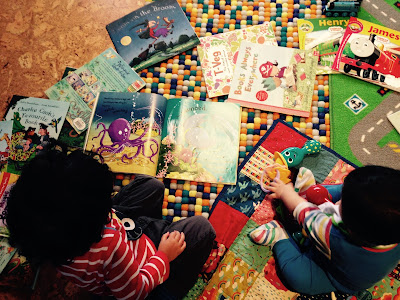Where To Find A Glimmer of Hope
Our future is suddenly uncertain. Our simple values of humanity: to be kind, thoughtful and welcoming, have been kicked to the kerb, beaten and spat upon, all in a matter of days. Yet, I want to invite you into a new world with a glimmer of hope, hidden away in your local library, or children's school.
This time last year, I was teaching English in a London school, my last term before maternity leave. Since then, I've nurtured our little ones, day and night feeding, singing them to sleep and reading the same book multiple times. As I begin to consider an eventual return to the classroom, I'm feeling a little bit hopeful, maybe a window into a better future, filled with possibility, change and kindness.
Even the worst behaved, or most apathetic of students, in my opinion, can enjoy a good story. Sharing books, discussing, reflecting, writing about our response to Literature is therapeutic as well as informative. Lessons can induce laughter and sometimes tears. I've cried with Year 7s at the end of Michael Morpurgo's Private Peaceful, a tender and unflinching tale of the senseless injustice of war; we've laughed reading Holes, set in an American boy's juvenile disciplinary unit, by Louis Sachar. Well-known Shakespearean characters draw us in: the desperate lovestruck Juliet; we pity Othello and Desdemona as Iago's web of lies lead them to the bloody marital bed; or the mighty warrior, Macduff, reduced to tears as he learns of his family's slaughter in the haunting Macbeth: "all my pretty ones? Did you say all?"
Books can teach us so much, but above all, they teach us empathy. The longevity of a book affords us the time to imagine ourselves in the scenes; to consider what we would have done or how we would have reacted. The main characters become our secret friends, who reveal their inner most thoughts, whose dreams we share. The breaks from reading allow us to reflect upon the themes and the plot, the characters and their relationships. Books can transport us back in time, or into the future, like the favourite Year 9 text, Unique, by Alison Allen-Grey who creates a world where cloning is possible, asking us what it means to be human?
My last classes before maternity leave were studying a range of heavyweight fiction. The senior class was reading George Orwell's 1984: a hot favourite in the wake of Trump's Presidency. Only twelve months ago, we tried to link this to our present day and discussed issues of surveillance, social media and a free press. The issues of Newspeak, torture, erasing historical facts and creating "Alternative Facts" like 2 + 2 = 5, were dismissed as being more relevant to fiction, or maybe episodes of European history. As dark as current affairs are, take comfort in the fact that students around the world are learning through History and Literature, how to make a more tolerant world.
They were also studying texts of the Holocaust, including Art Spiegelman's Maus and Bernhard Schlink's The Reader, provoking upsetting reflections, but necessary discourse. This included a trip to the Holocaust Exhibition at London's Imperial War Museum. The teenagers and teachers moved slowly around the museum, stony faced and sick to the stomach. In a mixed faith co-educational school, every student felt the chill of history and the resolve to never allow such abhorrent fear to govern again.
Another class was reading Harper Lee's To Kill a Mockingbird, a popular book to access American Civil Rights, with themes of bullying, prejudice and morality. This monumental text has inspired many to fight for human rights, stand up to racism and to study Law.
The younger students' class reader was The Breadwinner. Written by Canadian peace activist Deborah Ellis, this is a short and simple text told by charming and characterful Parvana, living in Taliban occupied Afghanistan. Every student seemed to relate to her everyday sibling squabbles or keen sense of parental injustice. When her family become victim to the regime, the students suffer along with her, sharing her fear and urging her bravery.
Even my two year old's reading is preparing him for a world where kindness prevails. A current favourite is Julia Donaldson's Zog with Princess Pearl, the trainee medic who rejects a life of riches in favour of helping people and "giving them my care." Room on the Broom, by the same author, teaches us that there's always more room to welcome others. Even when the broomstick breaks, they work together to fight the dragon and (with a little magic) they all help to create a new broom. His love for Thomas the Tank Engine show children the benefits of compassion and being helpful with the repetitive conclusion of being "really useful engines". A trip to the local library has become a weekly must, borrowing sky-high piles of picture books to feast on, taking us on global adventures through time and space.
The news may be heart breaking and the headlines tragically sad, but your local library is full of hope, packed with stories to inspire, cheer and soothe. Orwell's main character in 1984, Winston, is convinced that "if there is hope, it lies in the Proles". Maybe he's still right. Maybe the resistance will grow and become politically mobilised to win votes. I would say that our inspiration for hope lies with our children, their innocent joy for life, their unwavering need for justice and above all, their love of a good story.
For another feel good read, try Wonder in Mankind. Or for a total break from the jaw-dropping headlines, try 10 Unexpected Highs of Motherhood.





Comments
Post a Comment